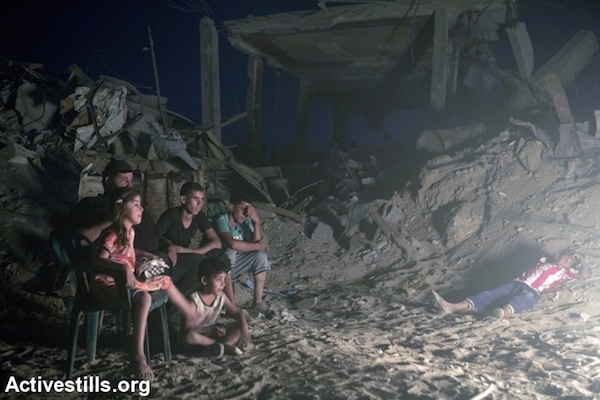It’s amazing with what ease and speed everyone — politicians, journalists and the public — can forget about Gaza. Who really cares about another five-year-old girl dying on the other side of the fence?
Translated from Hebrew by Sol Salbe

Only a few weeks have passed since the end of Operation Protective Edge and it seems as if Gaza never happened. Politicians are carrying on with their budget wars and the diversion provided by the start of the school year. The newspapers are again preoccupied with scandals about a former chief of staff and a weird misogynist cult. And everyone, every single person around, is closely watching developments with the Islamic State and the U.S.’s new military campaign against it.
On the other hand, no one takes notice that yet another five-year-old girl died in Gaza this week. Rahaf Abu Jame’s parents were killed in an Israeli bombing, as were at least 24 more members of the Abu Jame’ family in a single strike. The girl died slowly and alone over a long period of time. According to the Ma’an News Agency, Abu Jame’ is the third Gazan to have succumbed to war injuries during the past week, but in Israel nobody knows about it. Not that the Gazan death toll played too much of a role in the Israeli discourse during the war, but why it is not possible to report on the matter now, when the roar of the canons has ceased?
Neither has the media reported on Palestinian fishermen who are once again being arrested by the Israeli Navy. They don’t report on the severe water crisis affecting 75 percent of Gaza’s population; they only get access to water every four to five days, and even then only for a few hours. There are no reports in the Israeli media about raw sewage flowing into the sea off Gaza (and making its way to our shores) because of the collapse of electric and sewage systems, or the tens of thousands of displaced persons who have nowhere to return. Gaza, the siege which it is under, Hamas, the local population – everyone and everything is forgotten, as if it never happened.

And short of some dramatic change, that’s the way it’s bound to continue. All the evidence suggests that the Israeli government is not going to lift the siege. It is also not going to enter into negotiations with the Palestinian leadership on a permanent peace agreement. The government is primarily preoccupied with taking over more Palestinian land and is in the middle of a battle of wills with the High Court over its right to not destroy the settlements illegally built on privately owned Palestinian land. This government transfers much larger budgets to the settlements than, let’s say, those Israeli towns on the Gaza border that suffered most during the war.
In depth: Israel’s watershed moment that wasn’t
And what are the people of Gaza supposed to do now? You wanted quiet? It’s quiet. Not a single rocket has been launched at us since the cease fire. No armed cell has burst out from the sea or through a terror tunnel. Did you want to build confidence? Here you are, confidence is being built. All while little girls continue to die and the siege continues to suffocate Gaza, and the economy is in the doldrums and there is no water and there are no homes and there’s no removing the blockade and no real rehabilitation program and no future and there is nothing – it’s quiet.
Until next time. After all, if we do not talk about Gaza as long as they do not shoot at us from there, if we continue to let the 1.8 million people there just die slowly in that giant prison we built for them, then the shooting will resume. It may be at the end of the month or in a year, but resume it will. And if it isn’t shooting then it will be something from the tunnels, and if not that, something else. And then we’ll say they are criminals and ask why they are shooting at us; didn’t we reach a ceasefire already? So why are they attacking us? We’ll say that we really have no choice and that this time we really need to show them what’s what.
It’s one thing for the politicians to be indifferent, or for the public as a whole to not be interested, but it’s the professional duty of journalists to deal with Gaza, now more than ever, to explain what’s going on right now – if for no other reason, then to provide context for the next war.
Related:
Israel’s watershed moment that wasn’t
IDF’s ‘start-up nation’ reservists refuse to serve the occupation
Homeless and widowed: One Gazan’s tragic story
PHOTOS: Living in the ruins of a shattered Gaza neighborhood
This post was first published on +972’s Hebrew-language sister site, Local Call. Read it in Hebrew here.


